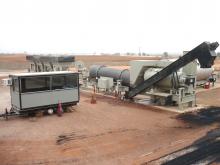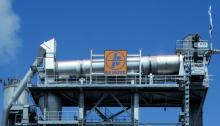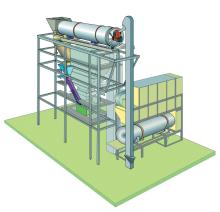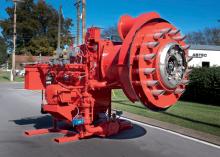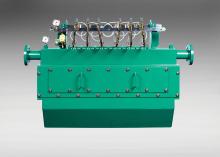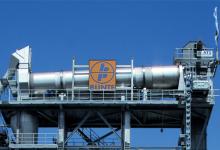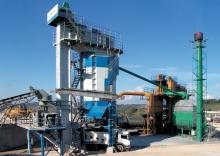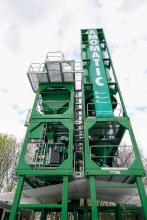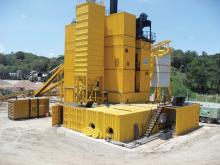
Plants for mixing asphalt are becoming more sophisticated than ever, while users are looking for ecological and technological benefits. Patrick Smith reports
When theThe new plant at Adige Bitumi Group's site in Mezzocorona, Province of Trento, northern Italy, "can certainly meet the needs of the Italian market with specific reference to new technologies" and is described as "a dive into the future."
According to Marini (part of the
Adige Bitumi Group owner Paolo Tellatin and his technical team had very clear ideas, thanks to the extended experience acquired on the company's own job sites (the group has five installations between Veneto and Trentino, and a sixth plant installed in Belgrade, Serbia).
"So it was easy to find the right feeling in designing a plant so complex, which had to be placed in the same space as the old plant," said Marini. The plant was designed with a high number of pre-dosing units (12 for aggregates plus three for the pre-processed and selected milled material) in order to guarantee maximum precision in dosages, and operational elasticity.
It is also possible to feed the hot recycled material line at the recycling line with two pre-dosing units and the cold line in the mixer with three pre-dosing units. All conveyor belts were encased to be able to reduce the emissions into the atmosphere.
"Thanks to the advantages of the drying tower with the bag filter and the storage silo for the fine products located directly above the drying drum, the TOP TOWER 4000 limits not only the ground dimensions, but guarantees optimisation of the heat energy balance (reduced length and insulated exhaust duct between the dryer and bag filter) and also the recovery of energy radiated from the drum," says Marini.
"With reference to the concepts of reducing emissions and sustainable development, the dryer burner was equipped with further atomisation of the fuel with a dedicated air compressor, and the plant was equipped with a bag filter with an increased filtering surface as well as sleeves in Nomex 500 material.
"With regard to the filler, an optimisation never before achieved in Italy was realised. The plant is equipped with two separate silos for recovery of the fine products and a silo for the intake filler, a cement storage silo and another for lime storage." A six-selection screening unit was chosen for the mixing tower (in the completely covered version with significant reduction of noise and heat loss), and this offers ease of screen replacement and maintenance thanks to a new Marini patent, which guarantees easy replacement of the screens and complete accessibility to them.
"Maximum attention was given to ease of maintenance with direct and easy access to the six hoppers under the screening unit; to the direct discharge, which was heated with electrical elements in order to optimise use of the milled material, as well as to the stairs and handrail complex (widened as required by European standards), which allow all of the plant's maintenance points to be reached without having to descend to the ground once leaving the cab.
"Significant care was also given to reducing noise and atmospheric emissions, and from this point of view the coverings of the mixing tower and the finished product storage silo (with a high storage capacity of finished product of over 400tonnes) were realised. The bag filter, with the entire drying tower, was covered with roofs overhead and protective folded roof sheeting on the sides.
The cisterns have rock wool insulation with increased all-round thickness at 200mm in order to be able to reduce heat loss to a minimum and consequently consumption for heating the bitumen. Five bitumen cisterns are provided with a capacity of 100m³ each 1 for combustible oil (capacity 100 m³); and 1 emulsion cistern divided into two compartments (60 m³ and 30m³) to feed the plant spraying cisterns separately; three plant feeding lines were provided: two for bitumen with the possibility of blending (mixing two different types of bitumen in the same mixture to obtain a bitumen with intermediate characteristics) and also one emulsion line to be able to produce cold conglomerates.
The extensive efforts of the alliance between the Adige Bitumi Group and Marini led to the creation of a plant which promises to be a point of reference for a new, evermore demanding clientele which is more and more oriented toward quality as a key factor in order to attack the modern market while at the same time paying more and more attention to energy savings, environmental impact and company economy.
RATech's RAP boost
As there is no direct heating of the recycled materials, the binder is not damaged in the process and this improves the quality of the ouput material.
This is a key feature of the system, as is the triangular profile dryer where the RAP is heated indirectly and which is conveyed cold in a vertical elevator to prevent sticking and build-ups. This would otherwise require periodic shutdowns for internal cleaning.
Hot material within the system flows from top to bottom, and heat loss is prevented because the RAP is stored in a heated bin.
Asphalt production at one of the Simge Group's quarries is able to use the entire output of the RATech plant to prepare a base course, using recycled asphalt that is mixed with a small proportion of fresh aggregate, bitumen and anti-aging additives. The RATech can also be incorporated with conventional asphalt batching plants to produce the higher quality binder and wearing course grades of asphalt.
For this, smaller percentages of recycled asphalt are used and the the pre-mixed output from the RATech is then mixed again with fresh materials from the conventional asphalt plant to meet the required specifications of the binder or wearing course.
E-MAK also offers its innovative Challenger system, which stores aggregates prior to use in an asphalt plant.
According to E-MAK the system's enclosed storage can cut overall energy consumption in asphalt production by up to 50% by reducing the amount of heating required to dry materials, and also reduce emissions. The company also says the Challenger can cut the use of electrical power by up to 20%; optimise bitumen use and lower its consumption by 10-15%.
Dust emissions are reduced because the crushed stone is stored internally in the Challenger, and this improves the environmental profile of the overall asphalt batching operation.
Norway's green way
The largest producer of Asphalt in Norway,The new Odin 4000H, 240tonnes/hour asphalt plant has been delivered by the Danish company
This new installation, which is scheduled to be fully operational at the end of June 2011, will be the largest installation in Norway so far, and high flexibility and focus on low energy consumption have been crucial to Kolo Veidekke in its search for the future asphalt production facility.
The plant's drying drum is heated by liquid gas, and the burner is controlled by the KVM-patented four-temperature measurement system fitted in the drum, a development that secures a very consistent temperature of the dried aggregates leaving the drying drum at reduced energy consumption.
The hot aggregate storage is split into two parts each consisting of six different bins and a common bypass facility, which offers the flexibility of storing dried aggregates at two different qualities or at two different temperatures (one for standard asphalt production and one for low temperature asphalt production). The temperature is particularly topical at Kolo Veidekke, which has specialised in the patented WAM Foam asphalt developed with
In a static mixer, bitumen and water are foamed together and introduced into the mixer while at the same time another bitumen is added directly into the mixer. The combination of WAM Foam technology and the addition of cold RAP (reclaimed asphalt pavement) directly to the mixer offers the right temperature for a high quality product with minimum energy usage.
Bitumen is stored in four 13m high KVM low energy vertical standing tanks, which each contain 95m³ of material. The tanks are filled by a KVM high capacity road tanker discharge pump and it is possible to move bitumen between the tanks by using this pump.
The asphalt plant has a total storage capacity of approximately 1,000tonnes stored in eight silos of which six are round mixed material silos each with a capacity of 115tonnes.
Bernardi's Red Dryer
Meanwhile,The equipment is designed to deal with up to 40% RAP as well as fresh aggregates, and features twin drives and twin geared motors.
In use, the operator sets the mix levels and a feeder system then transfers the bitumen and aggregates with RAP to the mixer in the quantities required. Mixing is carried out in the chamber at optimum temperatures to ensure a homogenous product.
The burner temperature can hit up to 500°C, although this does not cause problems with the RAP.
"The bitumen in the RAP does not burn as the flame does not touch the material," explains sales manager Alessio Belloli.
Because the dryer operates at a high temperature, the exhaust emissions are said to be clean and any distillates are removed by a venturi system [a jet-type effect].
Americo Farina, the company's technical director explained that some earlier generation systems designed to handle RAP had problems with emission levels but Bernardi Impianti's new equipment meets the tough European legislation as well as providing a high quality material output.
Farina said: "Another problem we have solved is humidity. Normally humidity would be a problem with RAP but we use a special mix to deal with this." The system also uses a special screen, designed to prevent blockage when handling RAP feed materials, which can be sticky due to the bitumen they contain. However, this new dryer ensures an effective coating process and because it uses RAP (which already contains bitumen) it offers substantial savings on bitumen costs to the customer.
Farina added: "In the end we have a customer saving for fuel of around 20%."
Ammann and SIM
The"While conventional hot asphalt is manufactured at around 170°C, modern low-temperature processes allow production temperatures of around 100°C. The Ammann range offers a number of these technologies. Foam bitumen, waxes and other additives, WAM Foam(r) or special bitumen are suitable for use depending on the application," said the company.
"We do not yet know which low-temperature technology will prevail in the future. But one thing is certain: low temperatures are the future of asphalt-based road construction. We are ready." The complete new BlackMove II asphalt mixing plant consists of six fully mobile trailers that are largely pre-assembled and ready-wired.
BlackMove II is available in categories of 160, 200, 240 and 320tonnes/hour, and the design includes various extensions such as feeds for cold reclaimed asphalt, fibres and enhancers.
The group has also announced that in 2011, Società Italiana Macchine (SIM) will celebrate its 50th anniversary and also 20 years as a member of the Ammann Group, which describes the Italian company as an important cornerstone of Ammann Enterprises.
"Ammann continues to bundle its forces in the markets and in technology. By integrating SIM more firmly within the Ammann Group, and by concentrating on one brand, Ammann is exploiting its joint global know-how with the aim of boosting the group's penetration in more and more markets all over the world. This will simultaneously increase the availability of services to customers.
"That is why SIM will be renamed Ammann Italy in 2011. The company's products will be marketed worldwide under the Ammann name through efficient distribution channels. The ownership structure of SIM will remain unchanged," said Ammann.
"From its base in Bussolengo, Verona, Ammann Italy will provide and expand marketing activities for all Ammann products and services in Italy (not only for asphalt mixing plants but also for compactors, pavers, and for products to be introduced in the future). This new approach will strengthen the Ammann Group's position around the world."
Benninghoven's Suriname task
German manufacturerThe rehabilitation of the eastern part of the Suriname East-West Connection route in north Suriname runs from Albina through Moengo and Tamanredjo and ends at Meerzorg near the country's capital Paramaribo. Known as Lot 2a, the section (one of a number of routes being upgraded in the country) is being repaved with funds from the
Work on the eastern section, in which Dutch company
It is estimated that about 150,000tonnes of asphalt will be needed to pave 73km of road, and the Benninghoven Mix Mobil MBA 2500 will supply this. With a mixing capacity of 200tonnes/hour, the four-deck screen machine has a 2.5tonne mixer.
Lower mixing temperatures
"Operating the system previously required a three-way valve, water and oil-line check valves, the patented expansion chamber and a separate foamed asphalt pipe line. This new simplified warm mix system features an in-line installation, so both hot and warm mix liquid asphalt is sent through a single pipe into the drum. The new set up offers several advantages for producers with extremely congested plant layouts," said Terex.
"By eliminating the liquid AC line check valve, plant operators can now reverse the system to clean oil from the pipes. A check valve on the water side of the expansion chamber ensures no liquid AC contaminates the water line." The system's programmable logic control (PLC) unit comes complete in a PLC/water skid package is designed to interface with most input signals from a variety of plant controls packages, and the PLC unit meters a predetermined percentage of water with liquid AC.
Beyond the PLC/water skid package, a hot-oil jacketed expansion chamber is the only other main component. Hot liquid AC and water combine inside the expansion chamber, and the foamed asphalt is immediately injected into the drum to evenly and thoroughly coat heated aggregate.
The system is capable of producing up to 544tonnes/hour of asphalt at a 4% injection rate.
Meanwhile,
The plant has 4tonnes of mixer volume; stone mastic unit; and standard road dimensions allow easy transport on all roads worldwide, along with easy installation.
When first produced it claimed a world-first for its five-floor screening system and since then research and development studies have been continuing to manufacture batch and drum mix-type mobile asphalt plants on a single chassis.
ÇESAN also produces related products and components such as electrically-heated bitumen tanks, modified bitumen tanks, stone mastic units, recycling units, thermal oil heaters, high pressure burners, dryers, screens, filters, and bitumen and fuel tanks.
Milemaker's warm mix
Asphalt Drum Mixers (ADM) has added a warm mix asphalt system to its Milemaker Series of asphalt plants. The new system is said to deliver even more versatility to the plants, which boast fuel-efficient, mix-design flexible and productive plants within the 160-425tonnes/hour range.Previously producing only hot mix asphalt designs, the Milemaker now has the capability to introduce water or other chemicals into liquid asphalt entering the plant, thus appropriately lowering the temperature to warm mix specifications.
The dual-drum plants use counterflow technology, which operates separate drying and mixing zones to achieve the maximum level of heat transfer and fuel efficiency. "This enables the Milemaker to achieve a high production volume and an extremely low cost-per-tonne average," says
Milemaker plants are available in portable, relocatable or stationary versions, and they also come prepared for future job specifications since dual-drum systems can easily be adapted to accommodate new mix specifications.
A wide range of components further customises each plant for particular customer needs. Available individual components include cold feed bins, horizontal and vertical hot oil asphalt cement tanks, direct-fired horizontal cement tanks, portable and stationary bag houses, mineral filler systems, recycled asphalt pavement systems, self-erect and stationary silos, weigh and drag conveyors, weigh batchers and fuel oil tanks.
The Milemaker can also handle large percentages of RAP without reducing the temperature or producing blue smoke.
In addition to the Milemaker, ADM also offers the Roadbuilder Series and SPL Series.
Astec's European job
US asphalt plant manufacture,
Sergey Dymov, who has an extensive background in the hot mix asphalt industry, having managing director and business unit responsibility for NCC Roads (Sweden) and ABZ-1 (St Petersburg, Russia), will be responsible for the sales and support of Astec hot mix asphalt plants and equipment in his region. This includes Ireland, the United Kingdom, Denmark, Norway, Sweden, Finland, Estonia, Latvia, Lithuania, Belarus, Ukraine, Moldova, Russia, Poland, Czech Republic, Kazakhstan, Turkmenistan, Uzbekistan, Krygyzstan, Georgia, Azerbaijan, Slovakia, Turkey and Tajikistan.
Steve Claude, vice president of international sales, said: "Sergey's knowledge and business acumen of the asphalt industry combined with his strong personal skills and attributes will serve him well in his new assignment. Having personally purchased and operated Astec HMA plants, he is already a strong advocate of what our technology offers."

